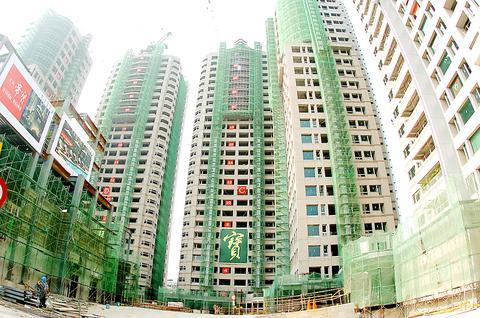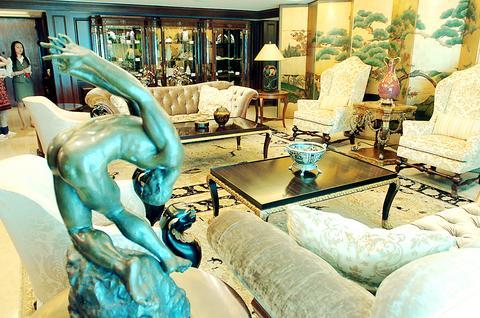Only billionaires will be able to afford an apartment at The Palace (
The complex, launched by Hung Sheng Construction Ltd (

PHOTO: GEORGE TSORNG, TAIPEI TIMES
It will also be one of the more secure housing estates, with features such as gun sensors, a pulse-tracking system and a 500m moat around its imposing exterior.

PHOTO: GEORGE TSORNG, TAIPEI TIMES
"Heads of local multinationals have expressed a high interest in moving in," Eric Kung (
While speculation around the market has been that the NT$25 billion project is only 40 percent sold, Kung boasted that the company has closed on 60 percent of the units and will hit the 80 percent mark before the year's end.
"The project targets high income people, whose buying decisions have less to do with the depressed property market," Kung said.
The Palace, located beside the intersection of Renai Road and Chienkuo S Road, faces the verdant and spacious boulevard, something rarely found in downtown Taipei.
Sitting on a 5,600-ping parcel of land, The Palace will be composed of six residential buildings, with heights of 18, 23 and 28 floors, and a "six-star" recreational club -- complete with a ballroom -- and is expected to be finished in the second quarter of next year.
Each unit, measuring between 160 and 260 pings and occupying a single floor, has an average selling price of approximately NT$1 million per ping -- nearly 25 percent more than that of neighboring residential projects, which average NT$800,000 per ping.
Hung Sheng got a bargain when it purchased the land from the KMT for as little as NT$9 billion in 2000. At the time many Democratic Progressive Party (DPP) politicians criticized former KMT treasurer Liu Tai-ying (
Hung Sheng spent over NT$20 billion to create the luxury compound, embedding more than 1,000 earthquake-proof dampers and using a design by well-known Japanese architect Tange Kenzo, who designed the Tokyo City Hall Complex.
That is why The Palace apartments are not cheap, Kung said.
"There is no other developer like Hung Sheng, which spends a minimum of NT$60,000/per ping alone on raw materials for its buildings," Kung said.
As the project's completion date draws near, more potential luxury home buyers are expressing an interest in the complex.
A saleswoman at the project said that approximately six buyers show up at the site on weekends, adding "more shoppers, who appear to be businesspeople, have been coming since mid-May."
Both Victor Chang (
Chang said that the project will be an indicator of a rebounding property market.
"If it sells well, the real-estate market may get a boost since wealthy people appear to have stepped up their economic and political confidence in Taiwan by making investments in valuable properties," Chang said.
Yen, however, doesn't think The Palace could be used as a barometer.
He said that Hung Sheng has been very tough on pricing -- be it a high or low property season -- which means that the project hasn't followed the up-and-down of the property market, which is gradually recovering after political tensions surrounding the presidential election.
"Buyers are buying into The Palace not simply because they can afford to, but also to demonstrate their social and economic status, which has nothing to do with the [property] market's prosperity," Yen said.
Both Chang and Yen, however, agreed that the project will take longer than expected to sell since its prices are high.
Yen, nevertheless, said there is no reason for Hung Sheng to reduce its prices since there are plenty of high earners, whom he called "big bosses," who can afford and are willing to buy.
Yen said The Palace will be a very profitable deal for Hung Sheng, estimating the company will see NT$10 earnings per share after the complex is filled.
Hung Sheng will not be the only business to profit from the massive complex.
It recently recruited top interior designers to work for its future tenants and is recommending luxury Baker House antique furniture -- with prices that easily go into the millions.

The Eurovision Song Contest has seen a surge in punter interest at the bookmakers, becoming a major betting event, experts said ahead of last night’s giant glamfest in Basel. “Eurovision has quietly become one of the biggest betting events of the year,” said Tomi Huttunen, senior manager of the Online Computer Finland (OCS) betting and casino platform. Betting sites have long been used to gauge which way voters might be leaning ahead of the world’s biggest televised live music event. However, bookmakers highlight a huge increase in engagement in recent years — and this year in particular. “We’ve already passed 2023’s total activity and

Nvidia Corp CEO Jensen Huang (黃仁勳) today announced that his company has selected "Beitou Shilin" in Taipei for its new Taiwan office, called Nvidia Constellation, putting an end to months of speculation. Industry sources have said that the tech giant has been eyeing the Beitou Shilin Science Park as the site of its new overseas headquarters, and speculated that the new headquarters would be built on two plots of land designated as "T17" and "T18," which span 3.89 hectares in the park. "I think it's time for us to reveal one of the largest products we've ever built," Huang said near the

China yesterday announced anti-dumping duties as high as 74.9 percent on imports of polyoxymethylene (POM) copolymers, a type of engineering plastic, from Taiwan, the US, the EU and Japan. The Chinese Ministry of Commerce’s findings conclude a probe launched in May last year, shortly after the US sharply increased tariffs on Chinese electric vehicles, computer chips and other imports. POM copolymers can partially replace metals such as copper and zinc, and have various applications, including in auto parts, electronics and medical equipment, the Chinese ministry has said. In January, it said initial investigations had determined that dumping was taking place, and implemented preliminary

Intel Corp yesterday reinforced its determination to strengthen its partnerships with Taiwan’s ecosystem partners including original-electronic-manufacturing (OEM) companies such as Hon Hai Precision Industry Co (鴻海精密) and chipmaker United Microelectronics Corp (UMC, 聯電). “Tonight marks a new beginning. We renew our new partnership with Taiwan ecosystem,” Intel new chief executive officer Tan Lip-bu (陳立武) said at a dinner with representatives from the company’s local partners, celebrating the 40th anniversary of the US chip giant’s presence in Taiwan. Tan took the reins at Intel six weeks ago aiming to reform the chipmaker and revive its past glory. This is the first time Tan